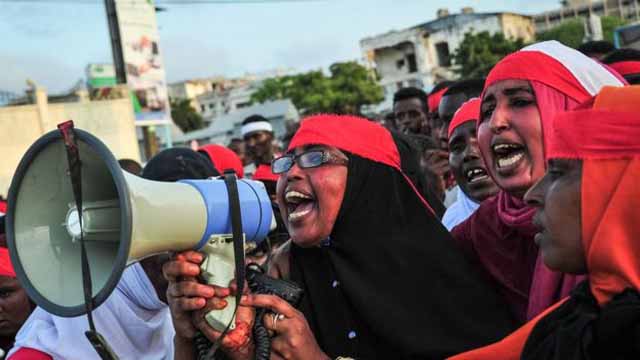International
Mass Shooting At Las Vegas, USA
On October 1, 2017, in Las Vegas, USA, a 64-year-old man, Stephen Paddock, opened fire from his 32nd-floor room in a casino onto people at a country music festival, killing 58 and injuring 546.
The US is no stranger to this kind of mass shooting – it happens over and over again, in schools, in public places. In the horror following each massacre, the elephant in the room is the issue of gun control – a demand that is met with contempt by the Republican party and by US President Trump in particular.
President Trump is known to respond with unseemly, provocative and bigoted tweets to incidents like the London subway bombing, using such occasions to justify his travel ban on Muslims. But Trump responded to the Vegas shooting with banalities about the need to maintain “unity” and “love” in the wake of the “senseless murder” – and the White House said that “now was not the time” to discuss policy issues like gun control.
Paddock – enabled by laws in his state of Nevada – owned 40 guns, 23 of which he had in his hotel room with him. 12 of the rifles in Paddock’s hotel room were modified to incorporate a device called a “bump stock,” which enables semi-automatic weapons to shoot rapid fire – like a machine gun. Gun manufacturers who fund political parties have managed to suppress demands for gun control over and over again, even as it’s widely acknowledged that the US has a gun problem – a mass shooting epidemic.
Terrorist Attack In Somalia
 A truck bomb in a busy locality of the Somali capital Mogadishu on 14 October killed 358 people and injured more than 400. It is suspected that the terrorist group Al-Shabab is responsible for the bombing.
A truck bomb in a busy locality of the Somali capital Mogadishu on 14 October killed 358 people and injured more than 400. It is suspected that the terrorist group Al-Shabab is responsible for the bombing.
In the days following the massacre, thousands of Somali people have hit the streets in protest, wearing red head-bands to symbolize the blood of the victims and raising slogans of unity against the Al-Shabab.
The silence of US President Trump and Indian PM Modi – both usually quick to tweet about terror attacks in other parts of the world – on the Mogadishu bombing was conspicuous. Many commented that the silence perhaps reflected a callous unconcern for victims of terrorism who are black and Muslim, since this disrupts the Islamophobic and racist narrative around terrorism. While an official US statement declared that the US “will continue to stand with the Somali government,” many recalled that Somalia was one of the countries on Trump’s ‘travel ban’ list, a fact that made Trump’s personal silence and hypocrisy resonate louder.
